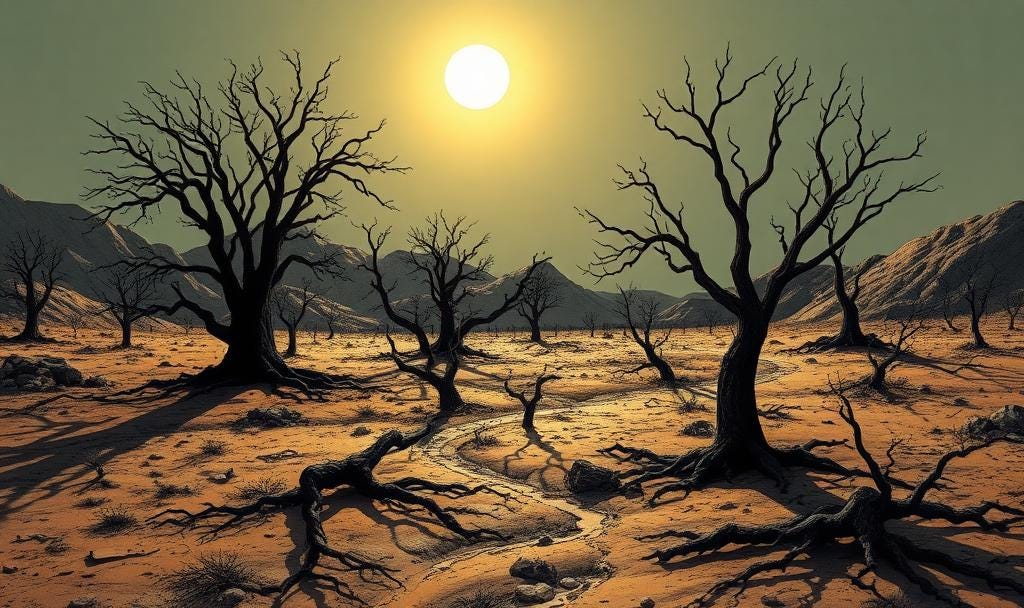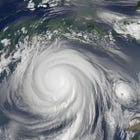Κλιματικές αλλαγές της φαντασίας
Εδώ και αιώνες οι άνθρωποι νομίζουν ότι αλλάζουν το κλίμα
Γύρω στο 1870 η Αγγλία υπέστη τρία συνεχόμενα χρόνια ξηρασίας, που δυσκόλεψαν την αγροτική παραγωγή και δημιούργησαν πλήθος δημοσιευμάτων περί αλλαγής του κλίματος. Στις 22 Αυγούστου 1870, η εφημερίδα Pall Mall Gazette του Λονδίνου δημοσίευσε το άρθρο «Imaginary Changes of Climate» (δικιά μου η έμφαση):
Τρία συνεχόμενα χρόνια ξηρασίας, ενώ έχουν διεγείρει την εφευρετικότητα των αγροτών, οδήγησαν και σε πλούσια συγκομιδή εικασιών από προφήτες του καιρού, ημιμαθείς μετεωρολόγους και όλους τους φιλοσόφους της Λαπούτας γενικά, στους οποίους ο τύπος πλέον παρέχει τέτοιες ολέθριες ευκολίες. Στους Times βλέπουμε συχνά πίνακες με συλλεχθέντα μετεωρολογικά δεδομένα, που είναι χρήσιμα και ευπρόσδεκτα, αλλά όπου κάθε εποχή παρουσιάζεται ως «ακραία», και σχεδόν κάθε μήνας ως ένας από τους πιο ξηρούς ή υγρούς, ή πιο κρύους ή ζεστούς που έχουν καταγραφεί ποτέ.
Οι πολλές μετρήσεις, που κανονικά θα έπρεπε να περιορίζουν την τάση προς υπερβολή, φαίνεται ότι σε πολλούς την ενισχύουν. Και πολλοί φαίνεται πλέον να θεωρούν τρία ξηρά χρόνια στη σειρά ως ένδειξη γενικής αλλαγής του κλίματος, σαν να μην ήταν απόλυτα βέβαιο, μέσα στο ευρύ φάσμα των πιθανοτήτων, ότι με τις υπάρχουσες συνθήκες κλίματος κάτι τέτοιο πρέπει να επαναλαμβάνεται κάθε τόσο.
Η υποτιθέμενη κλιματική αλλαγή ήταν, σύμφωνα με τα δημοσιεύματα στα οποία αναφέρεται το άρθρο, ανθρωπογενής, και οφειλόταν στην αποψίλωση των δασών. Στο υπόλοιπο άρθρο ο αρθρογράφος εξηγεί ότι αυτό δεν στέκει.
Το απόσπασμα που παρέθεσα ισχύει σήμερα ως έχει. Το υπόλοιπο άρθρο ισχύει και σήμερα αν αντικαταστήσουμε την αποψίλωση των δασών με τις εκπομπές διοξειδίου του άνθρακα.1
Σχετικό άρθρο μου:
Η ημερομηνία δημοσίευσης του άρθρου, 22 Αυγούστου 1870, εμφανίζεται σε σχετικά αποτελέσματα αναζήτησης. Το 1871 αναδημοσιεύθηκε σε εφημερίδα της Αυστραλίας, απ’ όπου και το μετέγραψα με τη βοήθεια του ChatGPT και το παραθέτω.
IMAGINARY CHANGES OF CLIMATE.
Three consecutive years of drought, while they have stimulated the inventive resources of practical agriculturists, have had the natural effect of calling forth a plentiful crop of speculation from weather prophets, and projectors, and half-instructed meteorologists, and all the philosophic tribe of Laputa in general, to whom the periodical press now affords such fatal facilities. We have often noticed that in the tabular statements of those compilers of weather records who write to the Times, useful and welcome as their communications are, every season is sure to be “extraordinary,” almost every month one of the driest or wettest, or windiest, coldest or hottest, ever known. Much observation, which ought to correct a tendency to exaggerate, seems in some minds to have rather a tendency to increase it. And many seem now to regard three dry hot years in succession as betokening some general change of climate, as if it was not perfectly certain, in the wide range of the table of what we call chances, that with our existing conditions of climate such a combination must every now and then recur. We know an ingenious theorist who would fain persuade us that a cycle of six hundred unfavorable years has just reached its termination, and that English agriculturists, who left off making wine about A.D. 1250 because their grapes ceased to ripen, will soon be making it again, and come in for a golden era of prosperity in consequence. Others, speculating with equal ingenuity and even more clearness, seem to attribute the impending change of climate—of which they assume the reality—to the operation of men. They fancy that by extended drainage and the cutting down of trees the amount of rainfall may have been diminished. As to drainage, it may suffice to remember that our rain is derived from the evaporation of the Atlantic, and is not likely to be affected by the diminution of that which proceeds from a few swamps. As to the effects of cutting down trees, the subject has been made so much of in recent times that it requires to be treated more respectfully. Yet there are two considerations which militate against the theory; the first relative to its application to England, the second to the doctrine in general. As to the first, it may be greatly questioned whether there has been for some generations past any diminution of our tree-covered surface. There is a balance of gain and loss. Some woods have been felled. Some districts, once rich in hedgerow timber, have been partially stripped for reasons of scientific agriculture. But, on the other hand, the Englishman’s passion for planting and for preserving timber has been steadily at work in the contrary direction. Take the neighborhood of London for an instance; any of us who are old enough may remember how, scarcely more than a generation ago, the spectator from any height commanding an extensive prospect would note great bare tracts of heath, of cultivated but unenclosed land, and of recently enclosed common with low treeless hedges. All this is altered now. Go where you will for a view in the “home counties,” seas of leaves seem to extend around on every side. And we believe that most people, if they consult their experience, will name this or that part of the parts of the kingdom with which they are acquainted. The local authorities who have been lately testifying themselves to prevent the disforesting of the New Forest, on the ground of apprehending deficiency of rain, are certainly indulging in very imaginative apprehensions.
But in the next place, what real ground is there for connecting together, in temperate climates at all events, the presence of forests and the frequency of rain as cause and effect? The assertion is so commonly made that to doubt its truth seems almost like contradicting a received physical fact. And yet it will be found on examination that it really rests on no solid foundation either of reasoning or experience. The question is a procès jugé et pas plaidé. As for the reason of the supposition, none whatever has been assigned, so far as we are aware, except that a surface shaded with woods is somewhat cooler than one denuded of it, and therefore likelier to attract the passing shower. How far this may be true it would be difficult to verify, or whether a hundred acres covered with wood really presents a cooler area than if covered with turnips or other vegetation; but the effect of such a cause as this must be very limited at any time, and (which is more important) it can apply only at the warm season of the year. In winter, when a full half of our rainfall takes place, the “open” is notoriously cooler than the shaded surface, and therefore should, by the supposition, attract more moisture. In cold countries—Canada, for instance—the woodsman can ply his trade in the sheltered interior of the forest when out-of-door work is completely suspended in the open land by reason of extremity of cold. Supposing, therefore, the precipitation from the air to be in any degree affected by the presence or absence of forest covering, one-half of the year ought to balance the other.
In France the prevalence of the theory that the clearing of woodlands diminished rain was such, a few years ago, as almost to produce a panic among philosophers; and in France the question could be tried experimentally with greater ease than here, because the surface of that country is more markedly divided between thick wood and bare fields than is the case with ours. Something meriting the name of observation was, therefore, applied to the problem, and we believe we are right in saying that the result hitherto arrived at is altogether adverse to any connection between the alleged cause and effect. Rainfall cannot be shown to have diminished generally in France through the removal of forests, which in the last hundred years has been very extensive, nor can it be shown locally that rain has diminished where forests have been cut down. One experimentalist compared for some years the meteorology of two adjoining valleys in Burgundy, the one covered with wood, the other entirely bare, and found that less rain fell in the former. But observation of this kind must no doubt be far more extensive and more prolonged to be really valuable, and none such has been applied since this question began to be agitated.
Of course, this scepticism of ours does not in any degree touch the real and provable utility of forests in agricultural economy. It has not been shown that they increase the rainfall, nor any good reason given for supposing it, but they are of the greatest service in economising it. They preserve the fallen water, both by the percolation which takes place more readily on the soil shaded by them than on exposed surfaces, and also by obstructing evaporation. They are most useful accessories both against flood and against drought. But under our English climate there is a contingency perhaps more injurious in the long run both to human health and the fruits of the earth than even flood or drought. This is the prevalence of damp, cold, sunless weather. Some suppose that an over-abundance of trees has a tendency to aggravate this particular evil. Certain it is that in the vicinity of that very New Forest, of which the maintenance is now so strongly urged by some climatologists, a large number of the inhabitants who can afford it are apt to migrate in what they deem the unhealthy season—the fall of the leaf—and resort to a more bracing and invigorating air.
Not only the effect of forest but the effect of modern field drainage requires to be established on far more accurate evidence than has as yet been obtained. We do not mean its effect on climate in the general sense, which we believe to be none at all; but on the preservation and distribution of water, on the permanent productiveness of the soil, and on human and animal health. These are questions of which we must leave to the scientific investigation to those who may come after us; for the present we are likely to content ourselves with deductions from very narrow experience and with very large conjecture and very confident assertion.




Δυστυχώς τώρα η κατάσταση είναι απείρως χειρότερη: οι πολιτικοί απατεώνες της Κομισιόν δημοσίευσαν στις 4/6/25 την έκθεση "2025 Country Report - Greece", όπου σε 126 σελίδες η λέξη "climate" αναφέρεται 84 φορές! Σ' έναν αχταρμά, που μπλέκει δασικές πυρκαγιές και σεισμούς με τους "κλιματικούς στόχους". Και, εδώ είναι το ζουμί, την ανάγκη να πληρώνουμε κερατιάτικα στις ασφαλιστικές εταιρείες για να μας "προστατεύουν". Νταβατζήδες, αυτό είναι το είδος της "προστασίας".